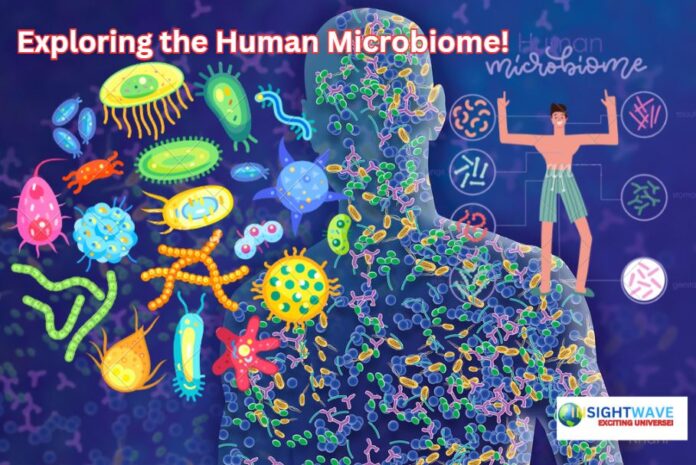In the intricate tapestry of the human body, an entire universe of microorganisms exists, hidden from plain sight yet playing a profound role in our health and well-being. This ecosystem, known as the human microbiome, has captured the fascination of scientists and researchers worldwide. As we delve into the depths of this tiny world, we uncover a story of symbiosis, resilience, and endless possibilities. In this article, we embark on an exhilarating journey to explore the human microbiome, an invisible realm teeming with life.
The Microbiome: A Hidden Universe
Imagine a bustling metropolis, teeming with diverse life forms, each with its own role to play in the grand scheme of things. Now, shrink this city down to a microscopic level, and you have the human microbiome. It’s a vast, complex ecosystem that inhabits our bodies, consisting of trillions of microorganisms, including bacteria, viruses, fungi, and other microbes. These tiny residents reside in various niches throughout our bodies, from our skin to our intestines, and they form a dynamic community that has a profound impact on our health.
The Gut: A Microbial Wonderland
One of the most exciting frontiers in microbiome research is the gut microbiome. Located in our intestines, it’s a bustling hub of microbial activity that rivals any tropical rainforest in terms of biodiversity. The gut microbiome is primarily composed of bacteria, and these tiny organisms play a crucial role in breaking down food, extracting nutrients, and even influencing our moods and immune system.
Recent studies have shown that the composition of our gut microbiome is influenced by factors such as diet, genetics, and environment. What’s even more astonishing is the potential for manipulating this microbial ecosystem to improve our health. Researchers are exploring the use of probiotics, prebiotics, and even fecal microbiota transplantation (FMT) to treat a variety of conditions, from gastrointestinal disorders to mental health issues.
The Brain-Gut Connection
The human microbiome doesn’t just influence our physical health; it also exerts a profound impact on our mental well-being. This intriguing connection between the gut and the brain, known as the gut-brain axis, has sparked a revolution in neuroscience and psychiatry. It turns out that the gut and the brain communicate through a complex network of neurons, hormones, and immune molecules.
Studies have shown that alterations in the gut microbiome composition can lead to changes in mood, cognition, and behavior. Conditions such as depression, anxiety, and even autism have been linked to disruptions in the gut-brain axis. This revelation has opened up new avenues for treating mental health disorders, with interventions targeting the gut microbiome showing promising results in clinical trials.
Microbiome and Immunity: Partners in Health
Our immune system is like a vigilant sentinel, guarding our body against invaders. But it turns out that it doesn’t work alone; it has a powerful ally in the human microbiome. The gut microbiome, in particular, plays a pivotal role in training and regulating the immune system.
The microbial residents in our gut help educate our immune cells, teaching them to distinguish between friend and foe. This crucial training process ensures that our immune system responds appropriately to threats while avoiding harmful overreactions, such as autoimmune diseases. The microbiome also produces antimicrobial compounds that can directly combat pathogens, further bolstering our defenses.
Microbiome and Disease: The Dark Side
While the human microbiome is mostly a force for good, it can also turn against us under certain circumstances. Dysbiosis, a disruption in the balance of microbial communities, has been linked to a range of diseases, including inflammatory bowel disease (IBD), obesity, and allergies. Researchers are working tirelessly to understand the complex interplay between the microbiome and disease to develop targeted treatments and preventive strategies.
Microbiome and Personalized Medicine
The era of personalized medicine is upon us, and the human microbiome is at the forefront of this revolution. With advancements in DNA sequencing technology, it’s now possible to profile an individual’s microbiome with unprecedented precision. This opens the door to personalized treatments and therapies that take into account an individual’s unique microbial makeup.
Imagine receiving a treatment plan tailored specifically to your microbiome, optimizing its composition to promote better health. This level of customization is not just a dream; it’s becoming a reality in fields ranging from gastroenterology to oncology, where researchers are exploring the microbiome’s role in cancer treatment and drug metabolism.
Exploration Beyond the Gut
While the gut microbiome has garnered much attention, other parts of the body harbor their own unique microbial ecosystems. For instance, the skin microbiome, composed of bacteria, fungi, and viruses, plays a crucial role in maintaining skin health and protecting against pathogens. Understanding these diverse microbiomes is a burgeoning field, with implications for skincare, wound healing, and even forensic science.
Conclusion: A Journey Unfolding
Exploring the human microbiome is a thrilling journey that reveals the intricate web of life within our bodies. From the bustling microbial city in our guts to the subtle influences on our mental and physical health, the microbiome holds the promise of unlocking new avenues for healthcare and well-being.
As we delve deeper into this hidden universe, we’re on the cusp of transformative discoveries and revolutionary treatments. The human microbiome, once a mystery, is now a frontier of science where researchers are poised to unlock its secrets and harness its power for the benefit of all humanity. So, join us on this exciting expedition into the world of the human microbiome, where the smallest inhabitants hold the keys to our health and future.


